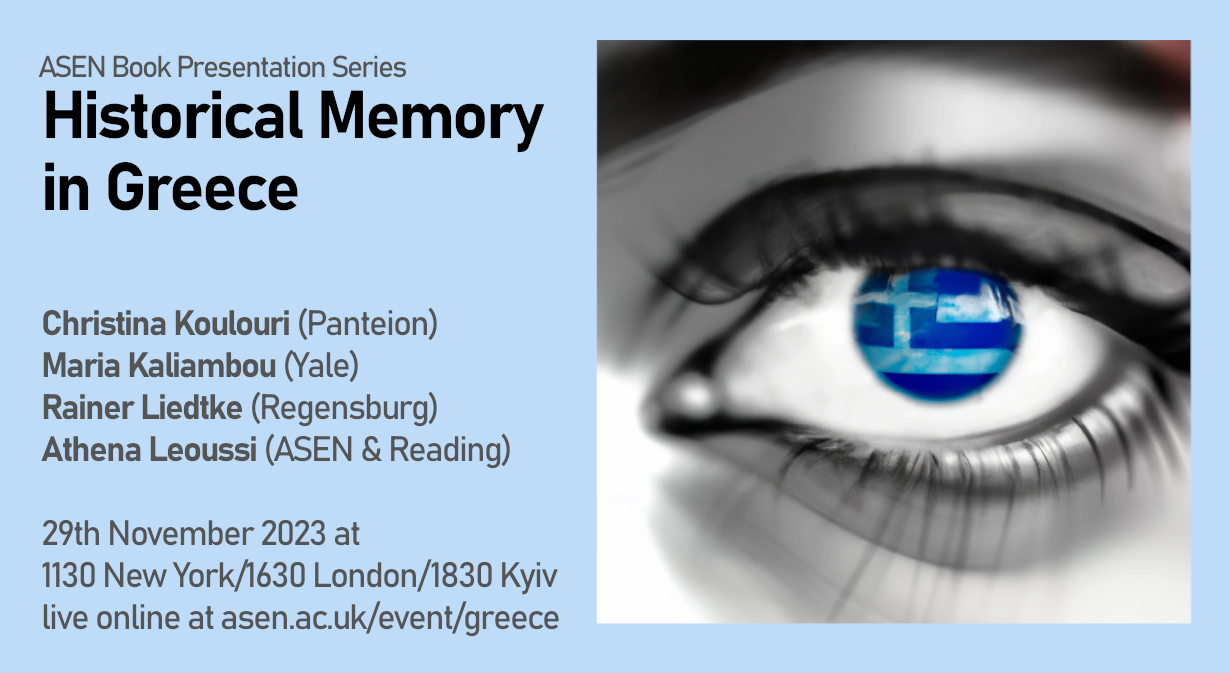Events
Historical Memory in Greece

Historical Memory in Greece
Join us on 29th November as we sit down to discuss Christina Koulouri’s new book, Historical Memory in Greece 1821-1930, with the author herself, Maria Kaliambou, Rainer Liedtke, and Athena Leoussi. We’ll be live on YouTube and Facebook; members will receive an invitation to join the Zoom call.
About Historical Memory in Greece
Historical Memory in Greece presents a social and cultural history of collective memory in modern Greece during the first century of state independence, contributing to the debate over the relationship between memory and identity. We’ll be live on YouTube and Facebook; members will receive an email to join the Zoom call.
It discusses how modern Greek society commemorated its distant and recent pasts, both real and imagined, namely antiquity, Byzantium, the Greek Revolution and the Asia Minor Catastrophe; how cultural memory was shaped by the various war experiences (victory, defeat, mass death and mourning, refugeedom); and how memory politics became arenas of social and political strife. Historical painting, monuments, historical pageantry, tableaux vivants, national anniversaries, performances of ancient drama and revivals of ancient games are analyzed as instances where the past was visualized, represented, performed and “consumed”.
An explosion in public history has taken place over the last decades around the world, with a veritable flood of commemorations, anniversaries and “memory wars”. As more and more social groups claim the “right to remember”, public discourse and polemics have arisen at the same time that traumatic memory has become a field of international academic research. In the arena of public history, historical memory is being constructed through the sentimental, irrational reception of mythological narratives told through images.
Historical Memory in Greece is published by Routledge.
About Christina Koulouri
Christina Koulouri is Professor in Modern and Contemporary History and Rector of Panteion University of Social and Political Sciences (Athens, Greece). From 2013-2017 she was the Dean of the School of Political Sciences, Panteion University. She studied at the University of Athens (Department of History and Archaeology), the École des Hautes Études en Sciences Sociales and Paris I – Panthéon – Sorbonne where she also received her PhD. She was Visiting Research Fellow at Université de Paris I-Panthéon-Sorbonne (2010), Princeton University (2017) and the University of Regensburg (2019). Awarded with the Nikos Svoronos Prize (1993), the Delphi Prize (2012), and the Vikelas Plaque (2018). Author of several books and articles on the teaching of history, the history of historiography, national identity, memory, public history, and the history of sports and the Olympic Games. Her last book (2020) received the National Essay Prize in Greece.
About Maria Kaliambou
Maria Kaliambou is Senior Lector at the Hellenic Studies Program at Yale University. She earned her B.A. in History and Archaeology at the University of Thessaloniki, Greece, and her Ph.D. in European Ethnology/Folklore Studies at the University of Munich, Germany. She held post-doctoral positions at the University Charles-de-Gaulle Lille 3 and at Princeton University. In 2006, her dissertation received the Lutz Röhrich Prize in Germany as the best dissertation in oral literature, and in 2011 the European Commission elected her the Erasmus Student Ambassador of Greece. Her research focuses on the dialogue between folklore and book history, particularly in the diaspora. She is also interested in foreign language pedagogy, especially the teaching of Modern Greek. She publishes in Greek, German and English. In 2006 she published her first monograph with the title Home – Faith – Family: Transmission of Values in Greek Popular Booklets of Tales (1870-1970) (in German). In 2015 she published The Routledge Modern Greek Reader, Greek Folktales for Learning Modern Greek, Routledge, an anthology of Greek folktales for the foreign language classroom. In 2023 her edited volume “The Greek Revolution and the Greek Diaspora in the United States” was published both in English (Routledge) and in Greek (Asini). She is currently working on her next monograph, tentatively titled “The Book Culture of Greek Americans”.
About Rainer Liedtke
Rainer Liedtke is Professor of European History of the 19th and 20th Centuries at Regensburg. Since October 2014, holder of a W3 professorship in European History of the 19th and 20th Centuries at Universität Regensburg. 2013-2014 research associate at the Institute of History of TU Darmstadt. 2013 interim professor (representative of Prof. Dr. med. Jens-Ivo Engels) at the Institute of History of TU Darmstadt. 2009-2013 visiting professor and research assistant at the Institute of History of the TU Darmstadt and associate professor at the Historical Institute of the Justus-Liebig-University-Gießen. 2006-2009 Research associate and associate professor at the Historical Institute of the Justus-Liebig-Universität-Gießen, DFG project: “Zivilgesellschaft und familiäre Regulationsmechanismen: Die Großstadtwerdung Athens im 20. Jahrhundert als Testfall für das Konzept der ‘europäischen Stadt”. 2004-2006 interim assistant professor at the Department of History of Christian-Albrechts-Universität Kiel (Chair Prof. Dr. Christoph Cornelißen) and private lecturer at the Historical Institute of Justus-Liebig-Universität Gießen. 2004 habilitation in modern and recent history at the Justus Liebig Universität Gießen on “Kommunikationswege und Informationstransfer im europäischen Privatbankwesen des 19. Jahrhunderts”. 1991-95 doctoral thesis in modern history at St. Antony’s College, Oxford University: “Jewish Welfare in Hamburg and Manchester, 1850-1914”.
About Athena Leoussi (chair)
Athena Leoussi is a founder of ASEN and currently a member of the steering committee, having held various other roles in ASEN and with Nations and Nationalism, of which she is a Founder Editor. Her teaching and research interests include the history, theories and problems of nationalism and national identity; the comparative study of the peoples of Europe, including their political and cultural histories and contacts; the representation of national identity in art; race, anti-semitism and national identity in 19th Century Europe; and the role of the classical tradition in the making of modern national identities. As a result of her research interest in in the revival of the classical Greek body in modern Europe, she organised, together with Ian Jenkins, the British Museum exhibition, ‘Defining Beauty: The Body in Ancient Greek Art’.
